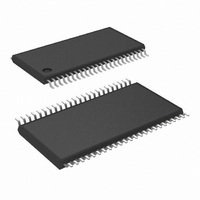COP8CCE9IMT7/NOPB National Semiconductor, COP8CCE9IMT7/NOPB Datasheet - Page 59

COP8CCE9IMT7/NOPB
Manufacturer Part Number
COP8CCE9IMT7/NOPB
Description
MCU 8BIT FLASH 8K MEM 48-TSSOP
Manufacturer
National Semiconductor
Series
COP8™ 8Cr
Datasheet
1.I2C-CPEV.pdf
(80 pages)
Specifications of COP8CCE9IMT7/NOPB
Core Processor
COP8
Core Size
8-Bit
Speed
10MHz
Connectivity
Microwire/Plus (SPI), UART/USART
Peripherals
Brown-out Detect/Reset, POR, PWM, WDT
Number Of I /o
39
Program Memory Size
8KB (8K x 8)
Program Memory Type
FLASH
Ram Size
256 x 8
Voltage - Supply (vcc/vdd)
2.7 V ~ 5.5 V
Data Converters
A/D 16x10b
Oscillator Type
Internal
Operating Temperature
-40°C ~ 125°C
Package / Case
48-TSSOP
Data Bus Width
8 bit
Maximum Clock Frequency
10 MHz
Data Ram Size
256 B
On-chip Adc
10 bit, 16 channel
Number Of Programmable I/os
37
Number Of Timers
2
Height
0.9 mm
Interface Type
SPI, USART
Length
12.5 mm
Maximum Operating Temperature
+ 125 C
Minimum Operating Temperature
- 40 C
Supply Voltage (max)
5.5 V
Supply Voltage (min)
2.7 V
Width
6.1 mm
Lead Free Status / RoHS Status
Lead free / RoHS Compliant
Eeprom Size
-
Lead Free Status / Rohs Status
Details
Other names
COP8CCE9IMT7
16.0 Interrupts
user program should contain the Software Trap routine to
perform a recovery procedure rather than a return to normal
execution.
Under normal conditions, the STPND flag is reset by a
RPND instruction in the Software Trap service routine. If a
16.4.2.1 PROGRAMMING EXAMPLE: EXTERNAL
INTERRUPT
WAIT:
PSW
CNTRL
RBIT
RBIT
SBIT
SBIT
SBIT
JP
.
.
.
.=0FF
VIS
.
.
.
.=01FA
.ADDRW SERVICE
(Continued)
=00EF
=00EE
0,PORTGC
0,PORTGD
IEDG, CNTRL
GIE, PSW
EXEN, PSW
WAIT
FIGURE 31. VIS Flow Chart
; G0 pin configured Hi-Z
; Ext interrupt polarity; falling edge
; Set the GIE bit
; Enable the external interrupt
; Wait for external interrupt
; The interrupt causes a
; branch to address 0FF
; The VIS causes a branch to
; interrupt vector table
; Vector table (within 256 byte
; of VIS inst.) containing the ext
59
programming error or hardware condition (brownout, power
supply glitch, etc.) sets the STPND flag without providing a
way for it to be cleared, all other interrupts will be locked out.
To alleviate this condition, the user can use extra RPND
instructions in the main program and in the Watchdog ser-
vice routine (if present). There is no harm in executing extra
RPND instructions in these parts of the program.
20022534
www.national.com










